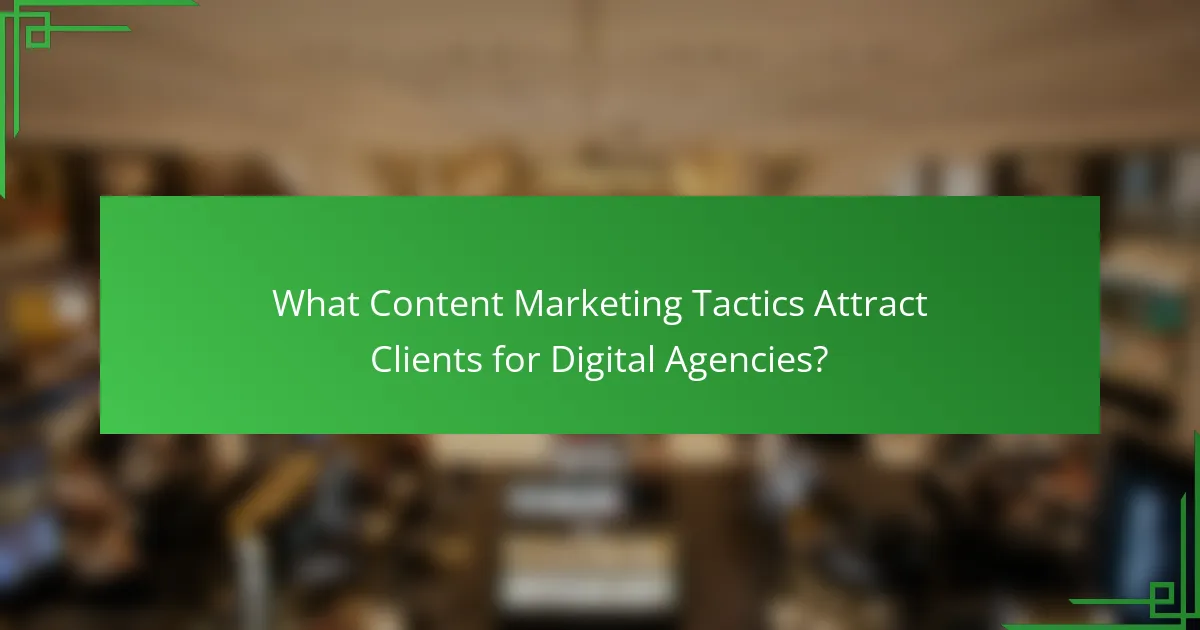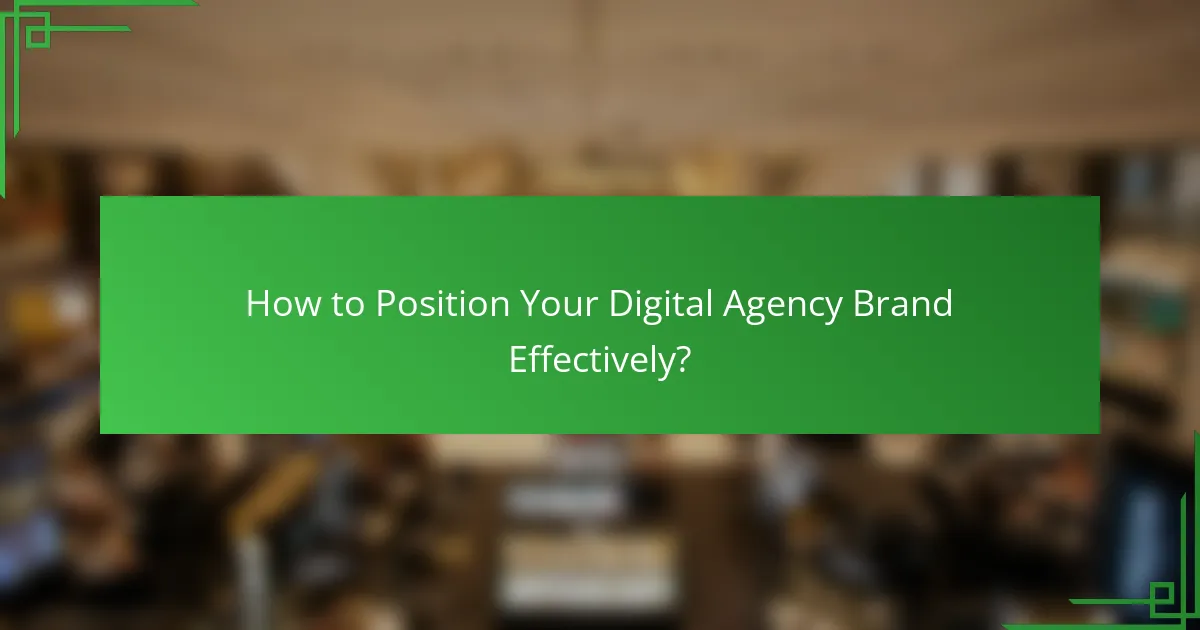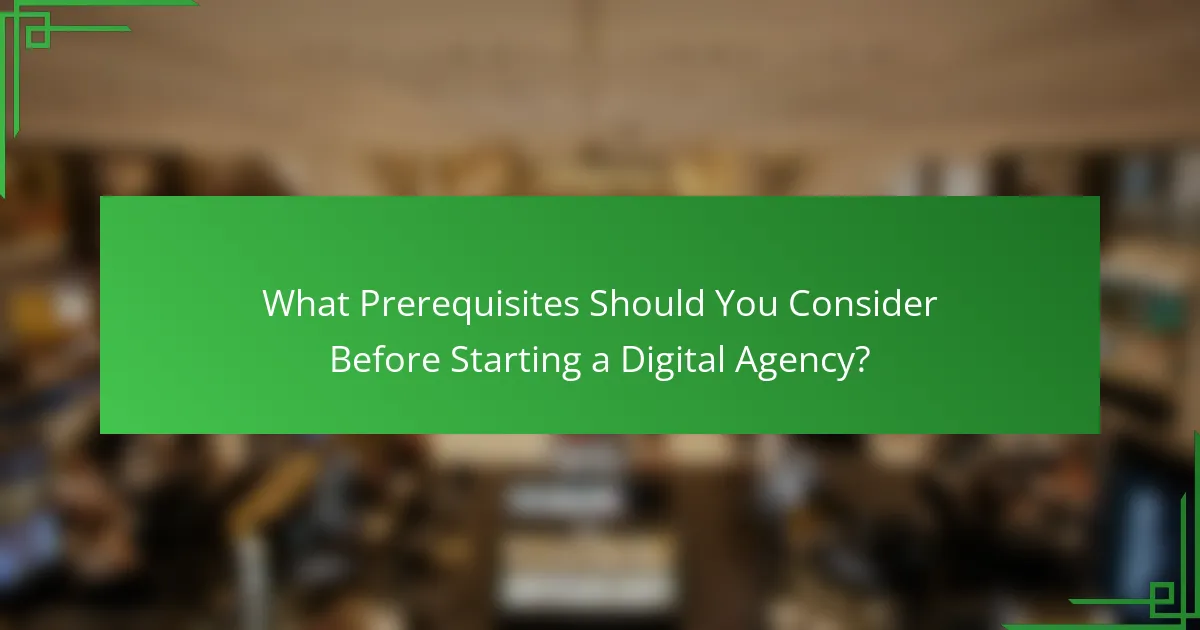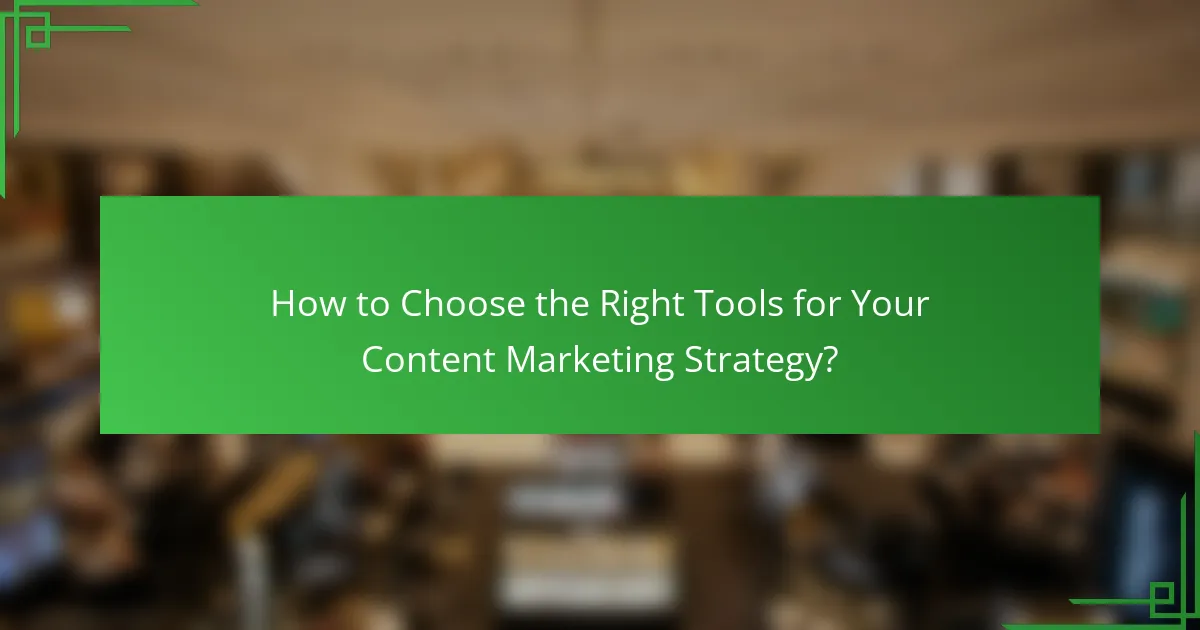In the competitive landscape of digital agencies, effective content marketing tactics are crucial for attracting clients and establishing a strong brand presence. By utilizing strategies like SEO optimization, social media engagement, and targeted email marketing, agencies can significantly enhance their visibility. Additionally, clear brand positioning that highlights unique strengths and resonates with the target audience is essential for differentiation and client connection.

What Content Marketing Tactics Attract Clients for Digital Agencies?
Effective content marketing tactics are essential for digital agencies to attract clients. By leveraging strategies such as SEO optimization, social media engagement, email marketing, and showcasing case studies, agencies can enhance their visibility and appeal to potential customers.
SEO Optimization Techniques
SEO optimization is crucial for increasing organic traffic to a digital agency’s website. Key techniques include keyword research, on-page optimization, and building backlinks. Agencies should focus on relevant keywords that potential clients are searching for, ensuring these are integrated naturally into their content.
Regularly updating content and optimizing for mobile devices can also improve search rankings. Tools like Google Analytics and SEMrush can help track performance and identify areas for improvement.
Social Media Engagement Strategies
Social media engagement is vital for building relationships with potential clients. Agencies should create a consistent posting schedule, share valuable content, and interact with their audience through comments and messages. Platforms like LinkedIn and Instagram are particularly effective for showcasing work and connecting with businesses.
Utilizing paid advertising on social media can further enhance reach. Targeting specific demographics and interests can help agencies attract the right clients more efficiently.
Email Marketing Campaigns
Email marketing remains a powerful tool for nurturing leads and converting them into clients. Agencies should develop segmented email lists to tailor messages based on the recipient’s interests and behaviors. Regular newsletters that provide industry insights and updates can keep potential clients engaged.
Incorporating clear calls-to-action in emails can encourage recipients to take the next step, whether it’s visiting the website or scheduling a consultation.
Content Creation Best Practices
Creating high-quality content is essential for establishing authority and attracting clients. Agencies should focus on producing diverse formats, such as blogs, videos, and infographics, to cater to different audience preferences. Consistency in branding and messaging across all content is key.
Utilizing a content calendar can help agencies plan and organize their content strategy effectively. This ensures a steady flow of relevant content that resonates with the target audience.
Case Studies and Testimonials
Showcasing case studies and client testimonials can significantly enhance credibility. Agencies should highlight successful projects, detailing the challenges faced, solutions provided, and results achieved. This not only demonstrates expertise but also builds trust with potential clients.
Encouraging satisfied clients to provide testimonials can further bolster an agency’s reputation. Displaying these prominently on the website and in marketing materials can attract new business effectively.

How to Position Your Digital Agency Brand Effectively?
Effective brand positioning for your digital agency involves clearly defining what sets you apart from competitors and communicating that to your target audience. This requires a deep understanding of your unique strengths, market needs, and the emotional connections you want to foster with clients.
Unique Value Proposition Development
Your unique value proposition (UVP) is a statement that summarizes why a client should choose your agency over others. It should highlight the specific benefits and solutions you offer that address client pain points. Consider conducting market research to identify gaps in services that your agency can fill.
When crafting your UVP, focus on clarity and conciseness. Aim for a one-sentence statement that encapsulates your agency’s strengths, such as “We help small businesses increase their online visibility through tailored content strategies.” Test your UVP with potential clients to ensure it resonates.
Brand Storytelling Approaches
Brand storytelling is a powerful way to connect emotionally with your audience. It involves sharing narratives that reflect your agency’s values, mission, and the journey behind your services. Use case studies or client testimonials to illustrate how your agency has made a difference.
To create compelling stories, focus on authenticity and relatability. Highlight challenges faced by clients and how your agency provided solutions. This approach not only builds trust but also positions your agency as a partner in your clients’ success.
Visual Identity and Design Elements
Your agency’s visual identity encompasses your logo, color palette, typography, and overall design aesthetic. These elements should consistently reflect your brand’s personality and values across all platforms, from your website to social media profiles. A strong visual identity enhances brand recognition and credibility.
When designing your visual identity, consider the emotional impact of colors and shapes. For example, blue often conveys trust and professionalism, while orange can evoke creativity and enthusiasm. Ensure that your design elements are adaptable for various formats, maintaining clarity and coherence.

What Are the Key Metrics for Measuring Content Marketing Success?
Key metrics for measuring content marketing success include website traffic, conversion rates, and social media engagement. These metrics help assess the effectiveness of your content strategy and guide improvements to attract and retain clients.
Website Traffic Analytics
Website traffic analytics provide insights into how many visitors engage with your content. Key metrics include unique visitors, page views, and average session duration. Tools like Google Analytics can help track these figures and identify trends over time.
To improve website traffic, focus on optimizing content for search engines and promoting it through various channels. Regularly review your analytics to understand which content resonates most with your audience and adjust your strategy accordingly.
Conversion Rate Tracking
Conversion rate tracking measures the percentage of visitors who complete a desired action, such as signing up for a newsletter or making a purchase. A typical conversion rate for content marketing can range from 1% to 5%, depending on the industry and the effectiveness of your call-to-action.
To enhance conversion rates, ensure your landing pages are clear and compelling. A/B testing different headlines, images, and calls-to-action can help identify what works best. Avoid common pitfalls like cluttered designs that distract from the main goal.
Social Media Engagement Metrics
Social media engagement metrics assess how well your content resonates with audiences on platforms like Facebook, Twitter, and Instagram. Key indicators include likes, shares, comments, and overall reach. High engagement rates often correlate with increased brand awareness and loyalty.
To boost engagement, create shareable content that encourages interaction, such as polls or questions. Monitor these metrics regularly to understand which types of posts perform best and refine your social media strategy accordingly.

What Prerequisites Should You Consider Before Starting a Digital Agency?
Before launching a digital agency, consider essential prerequisites such as market demand, your expertise, and the competitive landscape. These factors will significantly influence your agency’s potential for success and sustainability.
Market Research and Analysis
Conducting thorough market research is crucial for understanding your target audience and identifying gaps in the market. Analyze competitors to determine their strengths and weaknesses, and assess what services are in high demand. Use tools like surveys, social media insights, and industry reports to gather data.
Focus on specific niches within the digital marketing space, such as SEO, content marketing, or social media management. This specialization can help differentiate your agency and attract clients looking for expertise in those areas.
Business Model Selection
Selecting the right business model is vital for your agency’s structure and revenue generation. Common models include project-based, retainer-based, or performance-based pricing. Each has its advantages; for instance, retainer models provide steady income, while performance-based models can lead to higher earnings if you deliver strong results.
Consider your target market when choosing a model. For example, small businesses may prefer project-based pricing due to budget constraints, while larger corporations might be open to long-term retainers.
Legal and Financial Considerations
Establishing a solid legal and financial foundation is essential for your digital agency. Register your business according to local regulations, which may include obtaining necessary licenses or permits. Consult with a legal professional to ensure compliance with advertising laws and data protection regulations.
Financially, create a budget that covers startup costs, operational expenses, and marketing efforts. Keep track of cash flow and consider using accounting software to manage finances efficiently. It’s advisable to set aside funds for unexpected expenses to maintain stability during the initial phases of your agency.

How to Choose the Right Tools for Your Content Marketing Strategy?
Selecting the right tools for your content marketing strategy is crucial for efficiency and effectiveness. Consider your specific needs, budget, and the scalability of the tools to ensure they align with your marketing goals.
Content Management Systems
A content management system (CMS) is essential for creating, managing, and optimizing your digital content. Popular options include WordPress, HubSpot, and Joomla, each offering various features suited for different business sizes and types.
When choosing a CMS, consider factors like ease of use, customization options, and integration capabilities with other tools. A good CMS should allow you to streamline content creation and improve collaboration among your team.
Analytics and Reporting Tools
Analytics and reporting tools help you measure the effectiveness of your content marketing efforts. Google Analytics, SEMrush, and HubSpot Analytics are widely used to track website traffic, user behavior, and conversion rates.
Look for tools that provide clear insights and actionable data. Ensure they can integrate with your CMS and other marketing platforms to give you a comprehensive view of your performance metrics.
Social Media Management Platforms
Social media management platforms facilitate the scheduling, monitoring, and analysis of your social media content. Tools like Hootsuite, Buffer, and Sprout Social allow you to manage multiple accounts from one dashboard.
When selecting a platform, consider features such as post scheduling, engagement tracking, and reporting capabilities. Choose one that fits your team’s workflow and helps you maintain a consistent online presence across various channels.


